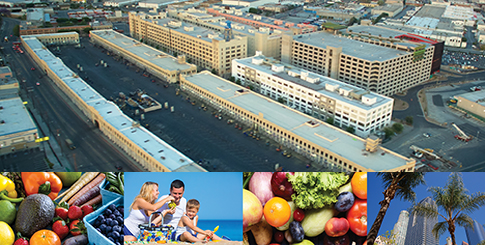Welcome to Blue Book!
Are you ready to join the thousands of companies who rely on Blue Book to drive smarter decisions? View our plans and get started today!
Still have questions? We’d love to show you what Blue Book can do for you. Drop us a line– we’ve been waiting for you.

Jeffrey McLellan is service and support manager for QSI, LLC, a receiver, shipper, and distributor. “We’re spitting distance from the market—in the hub of activity, but at less cost per square foot. Many companies are moving off market to Vernon or the City of Commerce for cheaper warehouse space. There’s much more congestion now and having more space a little out of the way allows us to operate better.”
Eureka Specialties, Inc., which supplies fresh culinary herbs, is just a few blocks from the market. President Jim Krouse values the close proximity: “We can pick up any items from the market that our customers want and ship them directly. Our location is great for local truck deliveries or for overnight air freight.”
Another wholesaler near the Market but not on it is Shapiro-Gilman-Shandler Company, a longtime merchant founded back 1907. The business began with horses and carriages on the Ninth Street market and today operates a state-of-the-art facility on nearby Decatur Street. Talia Shandler is the company’s general manager for fruit, and handles both domestic and imported commodities. While the business certainly thrived while on the market, she believes it is better off a few blocks away.
“Walking the market is a dying way of doing business—it’s like a mall full of stores with all the same merchandise,” Shandler explains. “An advantage of being on the market is it’s easier to find buyers for excess produce; on the other hand, we like being off the market because sometimes we have hidden gems customers can source. Someone will send a load of something unusual, and we have the flexibility to find the right customer for it. We provide value to growers by finding the appropriate home for their product, and getting maximum return.”
Fruitful Ideas
The Beauty of Ugly & Excess Produce
As a metropolis with an ethnically and economically diverse population, produce vendors on and around the Market are becoming more involved in providing wholesome food for those in need. This includes imperfect or ‘ugly’ produce as well as unsold items that are no longer fresh enough for traditional retail, restaurant, or institutional sales.
Organizations such as the Los Angeles Food Policy Council, founded in 2011 by then Mayor Antonio Villaraigosa, advances the building of a ‘Good Food’ system by bringing together leaders and experts in the community to strengthen connections throughout the food chain.
Another nonprofit, Food Forward, collects surplus produce from backyard growers, farmers’ markets, and produce wholesalers. Founded in 2009 and based in North Hollywood, the group distributes to hunger relief agencies in Los Angeles and surrounding counties in Southern California.
“We live in one of the great produce regions of the world and there’s so much waste while people are hungry,” says Luis Yepiz at Food Forward. “We rescue about 225 different types of produce—last year we picked up 7.6 million pounds, ranging from 25,000 to 120,000 pounds per day,” he notes. “Ours is a mutually beneficial arrangement: we take whatever viable produce they can’t sell, which provides the vendors with a tax deduction and makes room for the new produce coming in. We don’t have our own warehouse, but utilize the distribution network of our receiving agencies.”




